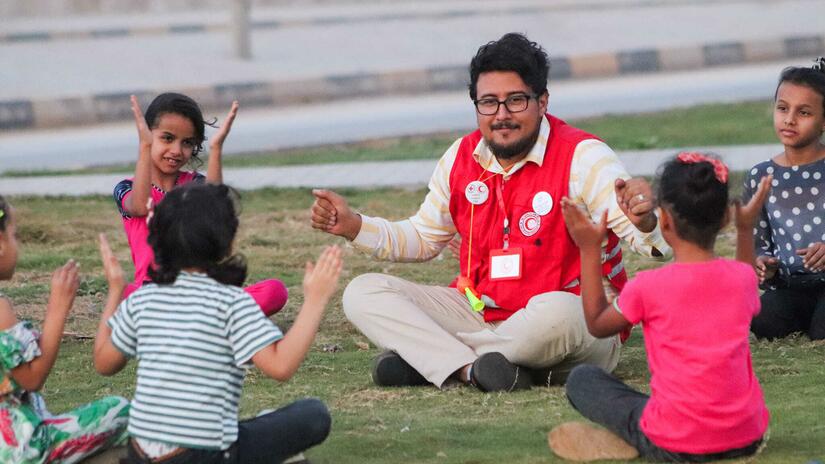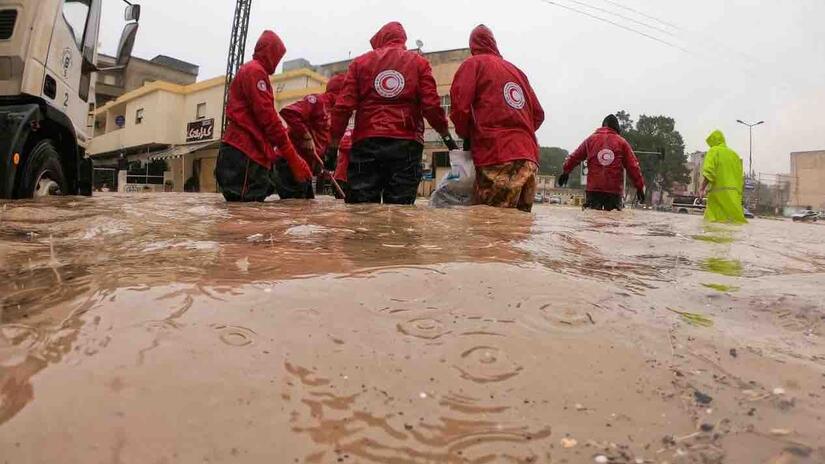By Mey Al Sayegh, IFRC MENA Head of Communications
Something as ordinary as rainy days and nearby seashores have sadly become a source of fear for those living in eastern Libya, especially for those who experienced first-hand the massive floods that swept-away their homes, cars, and loved ones in the blink of an eye, on the night of 11 September.
It is not an exaggeration to say that the most of the citizens of the worst-hit city of Derna, whose memories are burdened with painful images, are in need of some kind of psychosocial or mental health support. Signs of experienced trauma, such as children screaming during their sleep or sleepwalking, have become a nightly occurrence in Derna, and even in the nearby city of Benghazi, which is where most of families fled the devastation.
Urgent mental health support needed
In a poignant example from last week, two Libyan Red Crescent volunteers, well-versed in dealing with disasters, ran terrified to the Derna branch and hurriedly closed the doors behind them closed the doors because it had started to rain.
“People are associating rain with death," said Ali Gharor, mental health and psychosocial support officer at the Libyan Red Crescent Society. “All groups of people in the city need psychological support, including volunteers.”
Even those who have sought safety in Benghazi are affected. Haya Al-Hadar, a Libya Red Crescent volunteers, shares how the Red Crescent tried to provide a chalet for a family by the sea but they adamantly refused:
“I will never forget that night. I received a call at 1:30 am, and I was informed that the man refused to stay near the sea, because of his fear of coastal areas," he recalled. "[He] insisted on returning with his wife and children to where they came from. We provided them with an apartment outside the city.”
Despite Libyan Red Crescent providing psychosocial support and psychological first aid, the need for mental health professionals in the region is urgent.
“Children and the elderly visit my clinic on a daily basis and ask for psychological support in this field hospital," says Dr. Al-Siddiq Al-Haj Ali, who serves as head of mental health at the Misrata Center affiliated with the Libyan Ministry of Health and who also volunteers in Derna. "Time is of the essence. If those affected are not given psychological support during the next three to six months, we can expect to see more psychological disorders and even cases of suicide.”
Red Crescent volunteers among the affected
Through IFRC’s visits to affected areas and conversations with volunteers, it was evident that Libyan Red Crescent volunteers are also in dire need of mental health support, some of them having lost their families, loved ones, and homes.
For volunteer Hamdi Ahmed Belaid, one of the first responders to the disaster, time has stood still since the night of 11 September, when a phone call he received from his mother at approximately 2:15 am turned out to be the last time he heard her voice. When Hamdi returned to his neighborhood he was devastated at the sight of his home having been swept away, taking the lives of his parents and three brothers as well as the lives of many neighbours.,
In spite of his personal tragedy, Hamdi insists on continuing his work to help those affected: “Assisting those affected cools the fire in my heart," he adds.
Ali Gharor, the mental health and psychosocial support officer for the Libyan Red Crescent, understands Hamdi's predicament very well. “Unfortunately, there seems to be no time for volunteers to grieve, and this will likely reflect negatively on them later on," he says. "Our customs and traditions are also preventing some of them from showing weakness, but it is necessary to let grief take its time.”

A Libyan Red Crescent volunteer plays with children after floods in the city of Derna.
Photo: Libyan Red Crescent
IFRC specialized mental health unit will support Libyan Red Crescent
Given the massive needs, IFRC and other Red Cross and Red Crescent Movement partners have agreed with the Libyan Red Crescent to provide support in this critical field, while being mindful of the cultural context and customs in relation to mental health support in the country.
The IFRC is preparing to send an emergency response unit specializing in mental health and psychosocial support to the affected areas very soon. Raja Assaf, Head of IFRC Emergency Operations in Libya, explains that the unit will include mental health specialists, medication and other equipment, as well as a team to train more local Libyan Red Crescent staff and volunteers in providing psychosocial support.
“For us and the Libyan Red Crescent, this is a clear priority as we definitely try to avoid any mental health ticking time bomb and care for those affected as best as we can,” he concludes.





